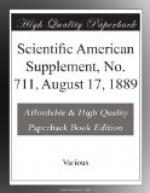* * * * *
ON THE HEALTH VALUE TO MAN OF THE SO-CALLED DIVINELY BENEFICENT GIFT, TOBACCO.
By J.M.W. KITCHEN, M.D., New York.
With perhaps the exception of heredity, the question of stimulants and narcotics in their relation to the physical welfare of the race is second to none in importance. With trifling exceptions, the whole world is addicted to their use. The universality of such use has led many to consider them a necessity to man, and that they are God’s gifts to him, and, if rightly used, are of physical benefit. It may not be a perversion of judgment to consider that their widespread popular use is greatly due to the efforts of the race to gain anaesthesia for, and distraction from, those pains and punishments that are the inevitable sequence of departure from hygienic and social law on the part of the individual, his ancestry, and society in general.
The taste for these things is acquired, not natural, though the acquisition may be through hereditary influence. An idea is held by a majority of even fairly intelligent individuals that there is a justifiable, harmless, and even beneficial use of these substances by the general public, though acknowledging that beyond a certain indefinite line this use becomes an abuse.
I believe that there may occasionally be cases in which the physical benefits derived from their use outweigh the injury they inflict, but I think this use is very much less than is generally supposed, and if we can judge from the preponderance of evil effected by such use, these substances ought to be considered as the materialized curses of God rather than as beneficent gifts. The prevalent idea as to the beneficent nature of these substances I consider to be a delusion that can only be explained upon the hypothesis that there is a widespread lack of appreciation of the fact that, though they may have an immediate pleasant and agreeable effect upon the body, their injurious effects are cumulative, and are usually ultimate, and so distant as to be difficult of direct connection with their cause to ordinary observation. The more moderate the use of these substances, the more remotely is the effect removed from the cause and more difficult of detection. That the ordinary habitual, so-called moderate use of stimulants and narcotics, such as tea, coffee, tobacco, and alcohol, is, in the vast majority of cases, really an abuse, is a proposition that I think should be admitted by all who have given the subject an unbiased study.




